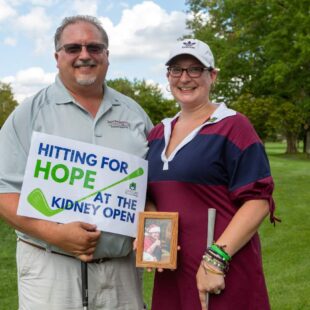Finding Support through your Hospital Chaplain
Chaplains are professionally trained individuals who reach across all faith lines to support patients and their families during a difficult medical time.
 Caregiver Lifeline
Caregiver Lifeline
Spotlight
by Laura Giannotti, MSW
Gift of Life Howie’s House Social Worker
Finding Support through your Hospital Chaplain
The transplant journey can bring up many different emotions, questions, and even doubts about your spiritual or religious belief system. For some, faith and spirituality may grow during this time, while for others it raises questions and doubts. Hospital/medical chaplains can offer support and comfort for you and your family regardless of faith, spirituality, practices, or belief system. Chaplains are professionally trained individuals who reach across all faith lines to support patients and their families during a difficult medical time.
How can the Chaplain help you during the transplant process?
Be an additional support person by providing a listening ear Chaplains can offer a warm, compassionate, and judgment-free presence. There may be times when at the hospital you feel lonely, anxious, angry, or confused. Talking with the chaplain about your experiences and feelings may help you feel better. Chaplains recognize that patients and families come from different cultural and religious backgrounds and their goal is to offer you guidance and support in line with your beliefs and comfort level, not force their own beliefs on you. Along with offering support, a chaplain can lend an ear to simply hear your fears and celebrate your joys. Whether you are deeply spiritual, do not believe in a specific religion, or fall somewhere in between, you may want someone to talk to and hear your thoughts. Chaplains can be a sounding board for you, and even offer support around decision making and finding meaning in your own or a loved one’s illness.
Support your beliefs and practices and provide guidance Faith can impact one’s emotional and physical well-being and chaplains can help you strengthen your spiritual health, if desired. This can be in the form of discussing faith-based questions you may have or discussing uncertainties about what you are going through. It can be a conversation around deepening your beliefs. A chaplain may be able to help you with your spiritual needs, such as lending you a Bible, prayer rug, Sabbath candles, etc. Although the resources available will vary among different hospitals, chaplains want to support you and address your spiritual needs in any way that they can. Additionally there may be a time when you want to participate in a religious ritual or receive a sacrament– the chaplain can help you by leading, scheduling, and sometimes even designing these rituals and sacraments. They can also pray with you and for you at any time – while you are at the hospital with the patient for a transplant evaluation, post-transplant appointment, during a hospitalization, while you or the patient is waiting to go into transplant surgery, or while you are visiting the patient in recovery.
Help you connect or reconnect Is there someone you would like to connect or reconnect with? Chaplains can act as mediators or reconcilers when needed. They can also help you connect to a faith community or with a particular belief system. If you would like someone from your faith community to visit, a chaplain may be able to coordinate this visit as well. Hospital chaplains are typically available between Monday and Friday, but at many hospitals, services are available 24 hours a day. Contact your hospital chaplaincy office or speak to your transplant social worker or nurse for specific information regarding their services and your needs. Additionally, please feel free to contact the Caregiver Lifeline Program Social Worker at CaregiverLifeline@GiftofLifeFamilyHouse.org.







